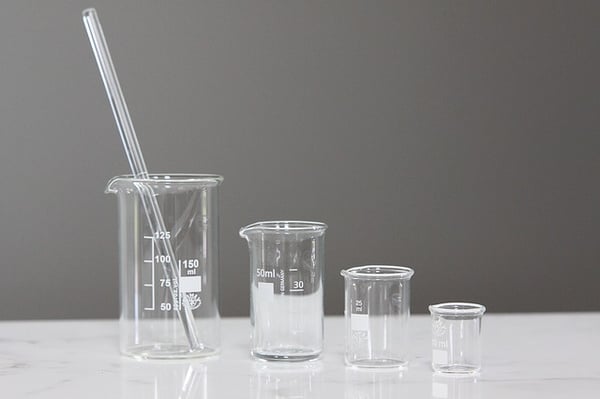
Acids get a bad rap—when we hear the word, we often picture some kind of vat of flesh-eating, lime-green liquid. But acids of all kinds, including muriatic acid, have tons of practical uses, and not just for super villains! Homeowners, leatherworkers, and even the pearl industry use muriatic acid on a daily basis.
This guide will cover what muriatic acid is, some common uses for it, and how to handle it safely.

Muriatic acid is great for heavy-duty cleaners.
What Is Muriatic Acid?
Muriatic acid, unsurprisingly, is a type of acid. Acids aren’t just dangerous liquids that must be handled with thick gloves (though some are!)—technically, an acid is anything with a pH of 7 or less. That includes vinegar and all citrus fruits, as well as some familiar acids you may have heard of, like hydrochloric acid or oxalic acid, which is found in baking powder and some bleaches.
Acids have many practical uses, including for household cleaning or adding flavor to food or beverages. Coca Cola has a pH of about 2.5, making it far more acidic than you’d expect for something we consume on a daily basis! And though bases and acids can be used to counteract one another, consuming a base can be just as dangerous as consuming an acid; lye, drain cleaner, and ammonia are all bases that can be quite dangerous.
So how about muriatic acid? Muriatic acid is a form of hydrochloric acid, which has a pH of about 1 to 2. The only differences between hydrochloric acid and muriatic acid are purity—muriatic acid is diluted to somewhere between 14.5 and 29 percent, and often contains impurities like iron. These impurities are what make muriatic acid more yellow-toned than pure hydrochloric acid.
Though still highly corrosive, muriatic acid is milder than hydrochloric acid and is therefore more suitable for home use.
At a pH of 1 to 2, muriatic acid can be as acidic as stomach acid (which is also in part comprised of hydrochloric acid) or lemon juice. However, pH level is not the sole determinant of its corrosiveness.
Despite sometimes having the same acidity as lemon juice, putting muriatic acid on your skin is always riskier than lemon juice. Lemon juice is five to six percent citric acid, whereas muriatic acid can be anywhere between 14 and 31 percent acid. So in addition to having a lower pH and therefore more acidic composition, muriatic acid is also more concentrated than lemon juice—hence why muriatic acid can easily burn bare skin, whereas lemon juice is unlikely to.
That’s why it’s always important to use safety gear if you’re working with muriatic acid, even if it’s been diluted, but not so much with lemons.

You probably don't want to use muriatic acid for everyday cleaning, but it can be useful!
What Are the Uses of Muriatic Acid?
Muriatic acid has a variety of uses, many of them industrial. As an acid, many of its uses are for cleaning or removing one substance from another. Some common uses for muriatic acid are:
- Processing raw leather
- Removing iron or rust from steel
- Removing the outside of pearls
- Household cleaning (basements and toilets with mineral stains)
- Cleaning bricks
- Clearing clogged drains
 Though it might not be as concentrated as some acids, safety gear is still essential when working with muriatic acid.
Though it might not be as concentrated as some acids, safety gear is still essential when working with muriatic acid.
How to Use Muriatic Acid Safely
Despite its myriad of practical applications, it’s important to remember that muriatic acid is still derived from hydrochloric acid, a potentially dangerous substance if not properly handled. Always adhere to good safety practices when using muriatic acid, such as:
Wear Protective Clothing
Muriatic acid may be less concentrated than hydrochloric acid, but it is still capable of causing burns to the skin and eyes. Always wear protective clothing when handling muriatic acid, including long sleeves, pants, gloves, and goggles or glasses. No matter what you’re using muriatic acid for, it’s possible for splashing or wind to cause liquid to land on your skin, so dress appropriately.
Add the Acid to Water
If you’re diluting your muriatic acid further, always pour the acid into water rather than vice-versa. Adding water to acid can cause a chemical reaction that makes the liquid bubble and spray in multiple directions, potentially causing injury if it lands on skin or eyes.
Do Not Mix
Muriatic acid is an effective cleaning agent on its own and should not be mixed with chemicals like bleach or potassium permanganate. Mixing these chemicals together produces chlorine gas, which can cause breathing problems and even death.
Complete Proper Disposal
Muriatic acid must be neutralized by adding baking soda to it. Don’t pour muriatic acid down drains without neutralizing it, as this can cause corrosion and environmental damage. The solution should be at a ratio of 1:50, meaning you must flush the muriatic acid and baking soda with a large amount of water to ensure that it is properly diluted.
If possible, dispose of the muriatic acid by containing it in a plastic bucket and taking it to hazardous waste disposal.
Use Proper Containment
Muriatic acid should be stored in plastic or glass containers, never metal, which it can corrode.
What’s Next?
Want to enrich your knowledge of acids and bases? These high school science classes could be just the thing!
There's lots of fun science you can do at home (and not all of it requires safety gear)—such as making slime!
What to know what you'll be learning in AP chemistry? This guide to AP chemistry syllabi will help you plan our your academic year to be even more effective!










